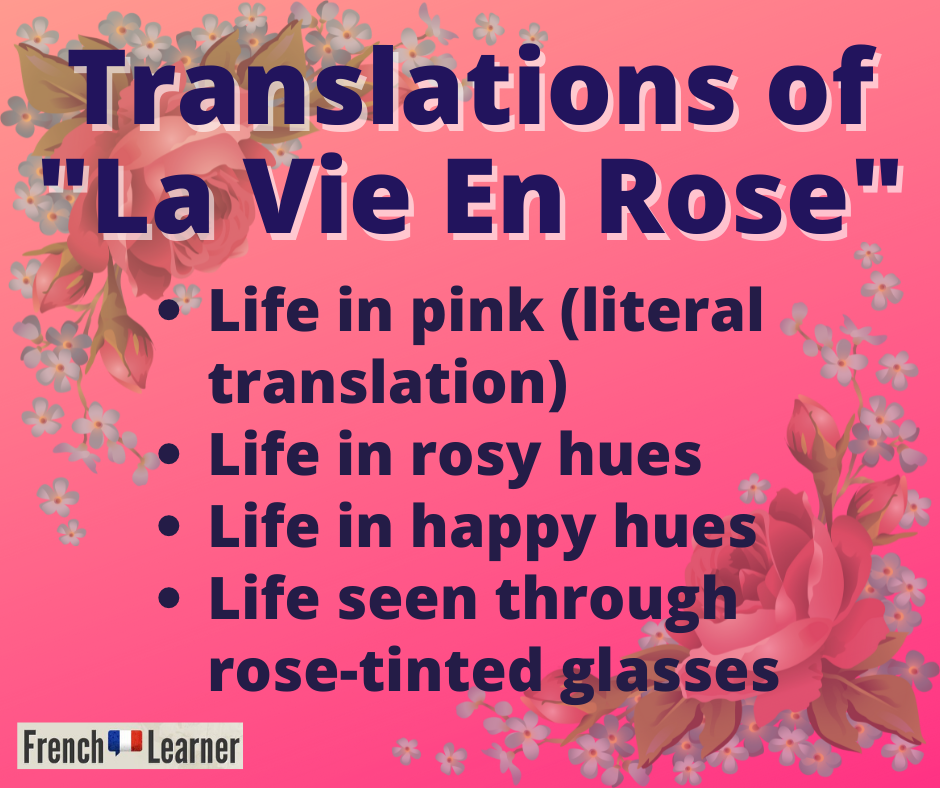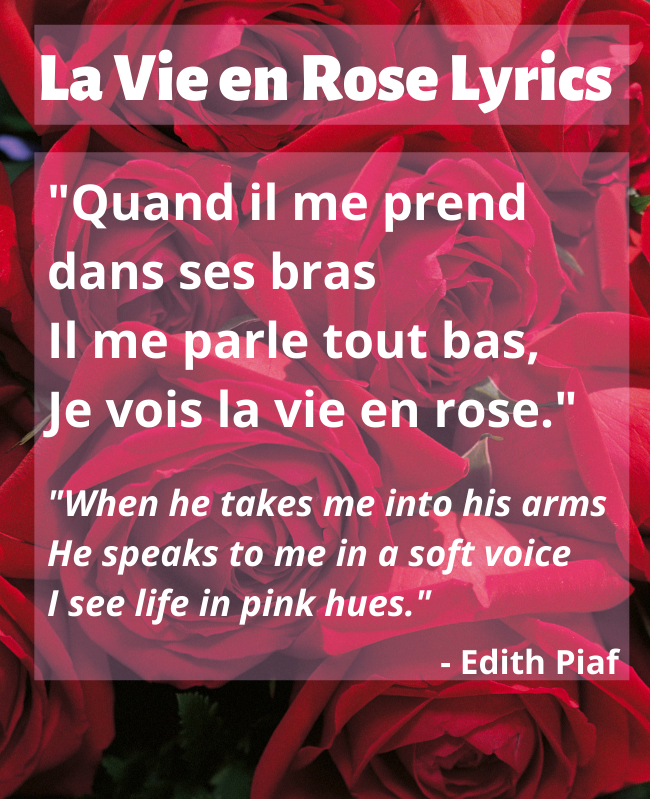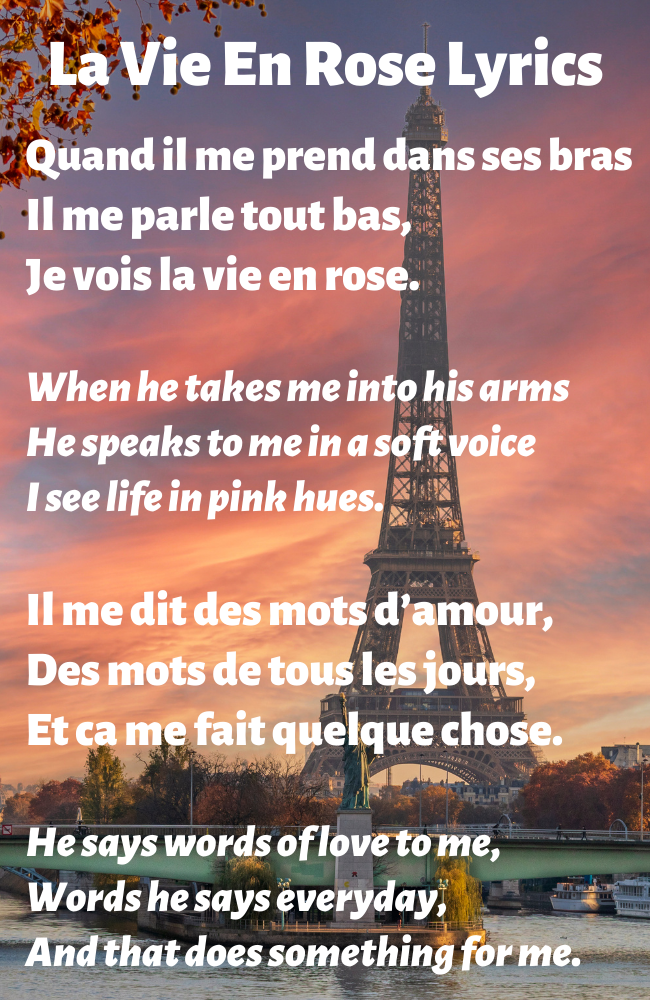“La Vie en Rose” (Meaning: Life in pink; Pronunciation: la vi ɑ̃ ʀoz) is the most famous and signature song of Edith Piaf, arguably France’s greatest singer of all time. In this post we’ll explain the vocabulary and grammar of the song’s lyrics line-by-line.

La Vie En Rose song overview
Edith Piaf was born in 1915 and started her singing career in the 1930s in Paris. She was known for her incredibly unique singing voice despite her height of only 4 feet 8 inches and stage freight. Piaf died at the age of 47 in 1963.
In lyrics of La Vie en Rose, Piaf evokes innocent and youthful feelings of love she has for a man, singing “When he takes me into his arms, he speaks to me in a soft voice, I see la vie en rose“.
La Vie en Rose came out in 1946 at the end of World War II and became one of the biggest French music hits of that era and of all time.
In 2007, a biographical feature film entitled La Vie en Rose about the singer and song won actress Marion Cotillard the Academy Award for Best Actress award.
Other notable recordings of La Vie en Rose has been made by artists including Yves Montand, Louis Armstrong, Bing Crosby, Dean Martin, Bette Midler, Donna Summer and Lady Gaga.
Listen to La Vie en Rose on YouTube & Spotify
Below you can listen to La Vie en Rose and following along with the French and English lyrics above.
If you have an account, you can listen to La Vie en Rose on Spotify.
La Vie En Rose line-by-line lyrics analysis
In the following section we break down the French lyrics to La Vie en Rose line-by-line and highlight vocabulary and grammar points of interest.
Des yeux qui font baisser les miens
We translated this line to “Eyes that make me lower mine”. Les yeux means eyes and is the plural of “un œil” (an eye). The verb baisser translates to “to lower”. “Les miens” is a possessive pronoun meaning “mine”.
Un rire qui se perd sur sa bouche
We translated this line to “A smile that hides under his mouth”. The preposition sur translate to “on”. So, technically the line is “on his mouth”. The word “sa” is a possessive adjective and can translate to both his and her.
Voilà le portrait sans retouche
We translated this line to “A portrait that needs no touching up”. The word voilà has many translations including “there is”. In the context of this line, Piaf is painting a metaphorical picture of her lover and suggesting that he’s perfect just the way he is.
De l’homme auquel j’appartiens
In this line, “de l’homme auquel j’appartiens” (from the man I belong to), the word auquel is a relative pronoun. The literal translation of auquel is “to which” or “to whom”. In colloquial French, auquel could also be written “à qui”.

Quand il me prend dans ses bras
This line translates “When he takes me in his arms”. The verb “prend” comes from the French verb prendre, which means to take. The expression, “pendre quelqu’un dans les bras” also translates to “to hug”. Hence, the line could also translates to “when he hugs me”.
Il me parle tout bas
This line translates to “He speaks to me in a soft voice”. The “me” in this line is not a reflexive pronoun, but an indirect object pronoun meaning “to me”. Translation for the expression “parler tout bas” include to speak softly or quietly and to whisper.
Je vois la vie en rose
This line, which also includes the title of the song has many translations including “I see the world through rose-colored glasses”. It is suggesting that when Piaf is with her lover, she is able to see and experience life through a filter of joy and happiness.
Il me dit des mots d’amour
This line translates to “He says words of love to me”. Again, the “me” is an indirect object pronoun meaning “to me”. Dit comes from the verb dire, which means to say. Amour is the French word for love. This page covers the various way to say I love you in French.
Des mots de tous les jours
This line translates to “everyday words”. Tous les jours means everyday. We believe that in this line Piaf is suggesting the lover can say any sort of basic banalities and she feels happy.
Et ça me fait quelque chose
This line can translate to both “And that does something to me” or “And that does something for me”. The word “fait” comes from faire, which means to make or to do.
Il est entré dans mon coeur
This line translates to “He entered my heart”. Entrer (to come into or to enter) is a verb that requires the use of être as an auxiliary (helping) verb in the passé composé (a French past tense used for describing past actions which occurred at a specific time).
Une part de bonheur
This line was difficult to translate. Our translation was “A part of happiness”. Steve at Linq translates this line to “a slice of happiness”.
Dont je connais la cause
The line “dont je connais la cause” translates to “French which I know the cause”. Dont is also a relative pronoun, with translations including whose, of which and that.
C’est lui pour moi. Moi pour lui
This line translates to “It’s me for him and him for me”. Both lui and moi are stressed pronouns, translating to “him” and “me”. This page covers stressed pronoun lui and this page covers various ways to say “me” in French.
Dans la vie, Il me l’a dit, l’a juré pour la vie.
This line translates to “In life, He said it to me, and swore it for life.”. In this line, the “l'” in “l’a dit” and “l’a duré” translates to it. This a direct object pronoun and means “it” to replace a previously mentioned noun.
Et dès que je l’aperçois
This line translates literally to “And once I realize it”. Translations of “dès que“ include once, as soon as and the moment that. “Aperçois” comes from the verb “apercevoir”, which means to perceive, notice and realize.
Alors je sens en moi
This line translates to both “So I sense within myself” or “Then I feel within myself”. Alors has multiple translations including so and then. The reflexive verb verb se sentir means “to feel”.
Mon coeur qui bat
This line translates to “My heart that beats”. Qui is a relative pronoun that means “that” or “which”. Bat comes from the verb battre, which means to beat.
Des nuits d’amour a ne plus en finir
This line translates to “Nights of love that never end”. The grammar for this line is very difficult. “Ne plus” comes from the special negation rule “ne + verb + plus”, which means anymore. The word “en” is an indirect object pronoun.
Un grand bonheur qui prend sa place
This line translates to “A great happiness that takes its place”. Translation of “bonheur” including happiness, joy, pleasure and delight.
Des ennuis des chagrins, des phases
We translated this line to “Troubles, griefs, bad times”. Ennuis translates to troubles, problems and worries. Chagrin is somewhat synonymous to ennuis and translates to unhappiness, grief, sorrow and sadness. We translated “phases” loosely to phases as “phases of bad times”.
Heureux, heureux a en mourir
This line translates loosely to “To die from happiness”. The word “en” in this context can translate to “from”. En is an object pronoun here, filling in for “mourir de + object”, or “to die from + object (happiness)”.

La Vie en Rose French lyrics and English translation
Des yeux qui font baisser les miens,
Un rire qui se perd sur sa bouche,
Voilà le portrait sans retouche
De l’homme auquel j’appartiens
Eyes that make me lower mine,
A smile that hides under his mouth
A portrait that needs no touching up,
From the man I belong to
Quand il me prend dans ses bras (chorus)
Il me parle tout bas,
Je vois la vie en rose.
When he takes me into his arms
He speaks to me in a soft voice
I see the world through rose-colored glasses.
Il me dit des mots d’amour,
Des mots de tous les jours,
Et ça me fait quelque chose.
He says words of love to me,
Everyday words,
And that does something for me.
Il est entre dans mon coeur
Une part de bonheur
Dont je connais la cause.
He has entered into my heart
A part of happiness
From which I know the cause
C’est lui pour moi. Moi pour lui
Dans la vie, Il me l’a dit, l’a juré pour la vie.
It’s me for him and him for me
In life, He said it to me, and swore it for life.
Et dès que je l’aperçois
Alors je sens en moi
Mon coeur qui bat.
And once I realize
Then I sense it in myself
My heart that’s beating
Des nuits d’amour à ne plus en finir
Un grand bonheur qui prend sa place
Des ennuis des chagrins, des phases
Heureux, heureux a en mourir.
Nights of love that don’t end
A great happiness that takes its place
Troubles, griefs, bad times
To die from happiness
Quand il me prend dans ses bras
Il me parle tout bas,
Je vois la vie en rose.
When he takes me into his arms
He speaks to me in a soft voice
I see the world through rose-colored glasses.
Il me dit des mots d’amour,
Des mots de tous les jours,
Et ca me fait quelque chose.
He says words of love to me,
Words he says everyday,
And that does something for me.
Il est entré dans mon coeur
Une part de bonheur
Dont je connais la cause.
He enters into my heart
A part of happiness
From which I know the cause
C’est toi pour moi. Moi pour toi
Dans la vie, Il me l’a dit, l’a jure pour la vie.
It’s me for him and him for me
In life, He said it to me, and swore it for life.
Et dès que je l’aperçois
Alors je sens en moi
Mon coeur qui bat
And once I realize
Then I sense it in myself
My heart that’s beating
Continue improving your French with the lyrics to many other famous French songs on French Learner including: Non, Je Ne Regrette Rien (Edith Piaf), Dernière Danse (Indilia), Port of Amsterdam (Jacques Brel), La Bohème (Charles Aznavour), Les Feuilles Mortes (Yves Montand), La Mer (Charles Trenet), Les Champs Élysées (Joe Dassin), C’est Si Bon (Yves Montand) and Ne Me Quitte Pas (Jacques Brel).
Discover more French songs:
- Top French songs of all time
- Édith Piaf – Non, Je Ne Regrette Rien
- Édith Piaf – Mon Dieu
- Édith Piaf – Milord
- Édith Piaf – Sous Le Ciel De Paris
- Top French songs of all time


